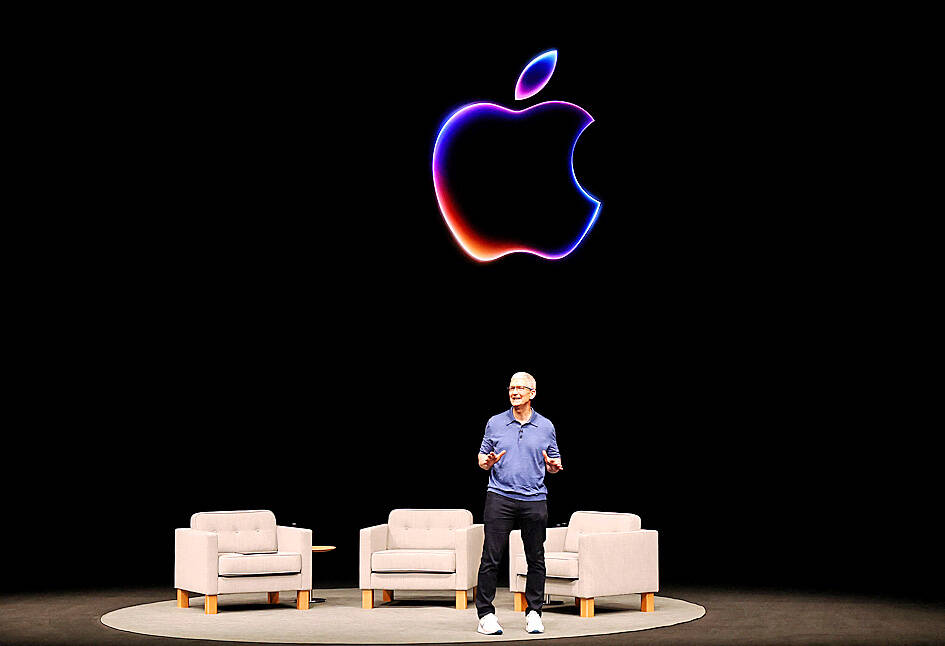Apple Inc on Monday unveiled “Apple Intelligence,” its suite of new artificial intelligence (AI) features for its devices — and a partnership with OpenAI — as it seeks to catch up to rivals racing ahead on adopting the white-hot technology.
For months, pressure has been on Apple to persuade doubters of its AI strategy, after Microsoft Corp and Google rolled out products in quick succession.
However, this latest move would take the experience of Apple products “to new heights,” Apple CEO Tim Cook said as he opened the annual Apple Worldwide Developers Conference at the tech giant’s headquarters in the Silicon Valley city of Cupertino, California.

Photo: AFP
To help toward that end, Apple has partnered with OpenAI, which ushered in a new era for generative AI in 2022 with the arrival of ChatGPT.
OpenAI was “very happy to be partnering with Apple to integrate ChatGPT into their devices later this year! Think you will really like it,” OpenAI CEO Sam Altman wrote on social media.
Apple Intelligence is also to be added to a new version of the iOS 18 operating system, similarly unveiled on Monday at the week-long conference.
Privacy safeguards have been built into Apple Intelligence to make its Siri digital assistant and other products smarter, without pilfering user data, Apple executives said.
The big challenge for Apple has been how to infuse ChatGPT-style AI — which voraciously feeds off data — into its products without weakening its heavily promoted user privacy and security, analysts said.
The system “puts powerful generative models right at the core of your iPhone, iPad and Mac,” Apple senior vice president of software engineering Craig Federighi said. “It draws on your personal context to give you intelligence that’s most helpful and relevant for you, and it protects your privacy at every step.”
However, tech tycoon Elon Musk lashed out at the partnership, saying the threat to data security would make him ban iPhones at his companies.
“Apple has no clue what’s actually going on once they hand your data over to OpenAI. They’re selling you down the river,” Musk wrote on social media.
Musk is building his own rival to OpenAI, xAI, and is suing the company, which he helped found in 2015.
Apple Intelligence, which runs only on the company’s in-house technology, would enable users to create their own emojis based on a description, or to generate brief summaries of e-mails in the mailbox.
Apple said Siri, its voice assistant, would also get an AI-infused upgrade and would appear as a pulsating light on the edge of the home screen.
In its deal with OpenAI, users can choose to enhance Siri on certain requests with ChatGPT, Federighi said.
“It sounds like it’s Apple — then if it needs ChatGPT, it offers it to you,” Techsponential analyst Avi Greengart said. “The implementation is what is special here.”
The partnership with OpenAI was not exclusive.

To many, Tatu City on the outskirts of Nairobi looks like a success. The first city entirely built by a private company to be operational in east Africa, with about 25,000 people living and working there, it accounts for about two-thirds of all foreign investment in Kenya. Its low-tax status has attracted more than 100 businesses including Heineken, coffee brand Dormans, and the biggest call-center and cold-chain transport firms in the region. However, to some local politicians, Tatu City has looked more like a target for extortion. A parade of governors have demanded land worth millions of dollars in exchange

Hong Kong authorities ramped up sales of the local dollar as the greenback’s slide threatened the foreign-exchange peg. The Hong Kong Monetary Authority (HKMA) sold a record HK$60.5 billion (US$7.8 billion) of the city’s currency, according to an alert sent on its Bloomberg page yesterday in Asia, after it tested the upper end of its trading band. That added to the HK$56.1 billion of sales versus the greenback since Friday. The rapid intervention signals efforts from the city’s authorities to limit the local currency’s moves within its HK$7.75 to HK$7.85 per US dollar trading band. Heavy sales of the local dollar by

Taiwan Semiconductor Manufacturing Co’s (TSMC, 台積電) revenue jumped 48 percent last month, underscoring how electronics firms scrambled to acquire essential components before global tariffs took effect. The main chipmaker for Apple Inc and Nvidia Corp reported monthly sales of NT$349.6 billion (US$11.6 billion). That compares with the average analysts’ estimate for a 38 percent rise in second-quarter revenue. US President Donald Trump’s trade war is prompting economists to retool GDP forecasts worldwide, casting doubt over the outlook for everything from iPhone demand to computing and datacenter construction. However, TSMC — a barometer for global tech spending given its central role in the

The Financial Supervisory Commission (FSC) yesterday met with some of the nation’s largest insurance companies as a skyrocketing New Taiwan dollar piles pressure on their hundreds of billions of dollars in US bond investments. The commission has asked some life insurance firms, among the biggest Asian holders of US debt, to discuss how the rapidly strengthening NT dollar has impacted their operations, people familiar with the matter said. The meeting took place as the NT dollar jumped as much as 5 percent yesterday, its biggest intraday gain in more than three decades. The local currency surged as exporters rushed to